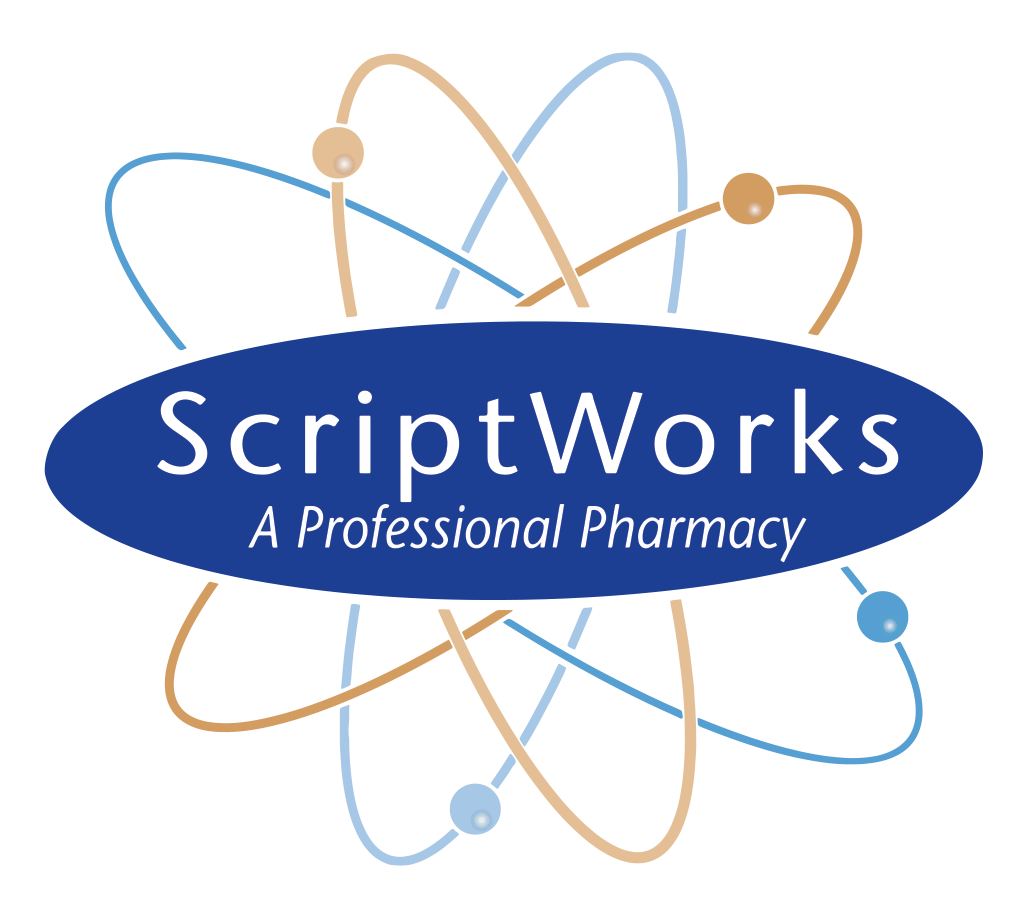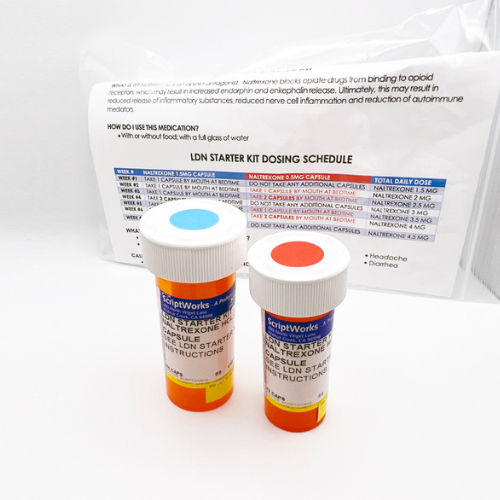
Author: Bob Brensel | President, Pharmacist | ScriptWorks
Bob Brensel, RPh, earned his Pharmacy Degree at University of the Pacific in Stockton, California in 1980. Former California Pharmacists Association’s Award Winner for Recognition of Outstanding Achievement in Compounding Pharmacy. Read More →
The Potential Benefits of Low Dose Naltrexone (LDN) for Autoimmune & Inflammatory Conditions in California
ScriptWorks Pharmacy, located in Walnut Creek, California, provides patients and healthcare providers with access to compounded medications, including low-dose naltrexone (LDN). As interest grows in alternatives that may support the body’s response to inflammation and immune dysregulation, so does consideration of the potential benefits of naltrexone in various clinical contexts.
Understanding Low-Dose Naltrexone
Naltrexone was originally approved in much higher doses (typically 50mg) for opioid and alcohol dependence. However, in significantly lower doses — often ranging from 1.5mg to 4.5mg — providers explored its potential to influence the immune system and inflammatory pathways. The 4.5-mg dose is one of the most commonly compounded strengths at ScriptWorks and is often associated with efforts to support individuals with autoimmune, chronic pain, inflammatory conditions, and more.
Low-dose naltrexone is thought to interact with the body’s opioid receptors and immune cells in ways that may impact inflammatory mediators. Research remains ongoing, and we continue to study its precise mechanisms. However, both patients and providers are increasingly discussing LDN as an option for off-label use.
Exploring the Potential Benefits of Naltrexone 4.5mg
Potential Immune-Modulating Properties
The interest in the possible benefits of naltrexone 4.5mg has largely centered around its potential to modulate immune function. In autoimmune conditions, the immune system mistakenly targets the body’s own tissues, leading to inflammation and damage. It is hypothesized that low-dose naltrexone may help influence the activity of immune cells and inflammatory cytokines.
Some preclinical studies and small clinical trials have evaluated LDN in autoimmune-related disorders such as:
In patients with multiple sclerosis, an autoimmune disorder that targets the central nervous system, LDN has been explored for its potential role in modulating immune activity and reducing inflammatory responses. Some clinical studies suggest that LDN may influence microglial activation and endorphin production, mechanisms thought to be involved in the neurological inflammation seen in MS. Providers may consider LDN for individuals who experience fatigue or neuropathic symptoms that persist despite conventional therapies.
Hashimoto’s thyroiditis involves an immune-mediated attack on the thyroid gland, often resulting in hypothyroidism. LDN is sometimes used in this population because of its potential to help regulate immune system activity, particularly by influencing T-regulatory cells and inflammatory cytokines. Anecdotal reports and case series have described improvements in fatigue and well-being, though these outcomes remain under formal investigation.
Rheumatoid arthritis is a chronic autoimmune condition characterized by joint inflammation and systemic symptoms. LDN may be explored in RA patients for its hypothesized effects on inflammation, especially when traditional disease-modifying drugs are not well-tolerated or provide only partial relief. The interest in LDN for RA often centers around its possible ability to suppress pro-inflammatory markers and improve patient-reported pain levels.
Crohn’s disease, an inflammatory bowel disease (IBD), causes chronic inflammation of the gastrointestinal tract. Some small-scale studies have examined the use of LDN in Crohn’s patients and have observed potential reductions in disease activity, which may be related to the modulation of the gut immune environment. Though more research is needed, LDN is occasionally considered for individuals with refractory symptoms who are seeking adjunctive, non-immunosuppressive options.
Psoriasis is a skin condition marked by rapid skin cell turnover and immune dysfunction. LDN may be considered in this setting because of its proposed anti-inflammatory properties and its potential to regulate keratinocyte activity. Providers who use LDN for psoriasis may be aiming to help manage flare-ups and reduce itching or scaling, particularly in patients who prefer to avoid systemic therapies or who have milder disease manifestations.
Providers may consider a trial of low-dose naltrexone for select patients when conventional strategies become insufficient or not well-tolerated.
Supporting Patients with Chronic Inflammatory Conditions
Beyond autoimmune disorders, low-dose naltrexone has also gained attention for its potential to influence inflammation and pain in other chronic conditions. These include fibromyalgia, chronic fatigue syndrome, and even long COVID.
For patients with persistent inflammatory symptoms, low-dose naltrexone 4.5mg is sometimes compounded to be taken at night, as some evidence suggests that nighttime dosing may align better with immune system rhythms. As with all compounded medications, the involvement of a knowledgeable pharmacist and prescriber is important to support safety and monitoring.
LDN Side Effects are Mild
Some individuals may experience side effects such as vivid dreams, headaches, or gastrointestinal discomfort, particularly during the early days of use. These are generally reported to be mild and may subside with continued use or dose adjustment. Since low-dose naltrexone does not exhibit the opioid-blocking effects at this lower dosage, it is typically not associated with the same concerns as the 50-mg version.
Choosing the Right Form of LDN: Capsules, Liquid, Sublingual Drops, and Topical Cream
At ScriptWorks Pharmacy, we recognize that one size does not fit all — especially when it comes to compounded medications like low-dose naltrexone (LDN). To support individual preferences, sensitivities, and therapeutic goals, we offer LDN in a variety of custom-compounded forms, including capsules, liquid, sublingual drops, and topical cream.
LDN Capsules
LDN capsules are the most commonly prescribed form and are often the first choice for those who tolerate oral medications well. They allow for accurate, consistent dosing and are convenient for daily use. Our capsules are available in various strengths, including the frequently requested 4.5mg dose, and can be compounded without common allergens or fillers based on individual needs.
LDN Capsule Titration Kit: Supporting Personalized Dosing
At ScriptWorks Pharmacy, we understand that starting low-dose naltrexone (LDN) often involves finding the right dose for each individual. To support both patients and prescribers in this process, we offer a capsule titration kit specifically designed for LDN. This kit allows for gradual dose increases, making it easier to monitor response and minimize any early side effects.
Why Titration Matters for LDN
Titration is the process of starting at a lower dose and slowly increasing over time until the target dose is reached. For LDN, this is especially important. Unlike traditional medications that have standardized starting doses, LDN is used off-label in significantly smaller amounts — typically between 1.5mg and 4.5mg. Because of this narrow and individualized range, patients may respond differently based on their immune sensitivity, symptom profile, and overall health status.
Some individuals may experience initial side effects such as vivid dreams, headaches, or gastrointestinal upset. These are often temporary and may be mitigated through a gradual dose increase. A titration approach allows the body to adjust more comfortably, while also providing prescribers with insight into how patients are responding at each dose level.
What’s Included in the Titration Kit
ScriptWorks’ LDN titration kits include pre-filled capsules in incremental strengths, clearly labeled for each stage of dosing. Simply follow prescribed dosing schedule our experts set with your prescriber. This eliminates the need for patients to cut or split capsules and ensures accuracy in dosing — an important factor in both safety and consistency. The kit comes with detailed instructions for use and support from our pharmacy team, who are available to answer questions throughout the titration period.
For new users or those with heightened sensitivities, the titration kit provides a guided path toward the optimal LDN dose — balancing potential benefits with patient comfort.
Contact our pharmacy to learn more about the LDN Titration Kit or click here.
LDN Oral Liquid
The liquid form of LDN is ideal for patients who require very precise dose adjustments, such as pediatric patients or those beginning with microdoses. It is also useful for individuals who have difficulty swallowing capsules. With liquid LDN, prescribers can tailor dosing in small increments, allowing for more gradual titration based on tolerance and response.
LDN Sublingual Drops
Sublingual (under-the-tongue) LDN drops offer an alternative for patients who prefer not to swallow medications or who may need quicker absorption. This form bypasses the digestive tract, which can be particularly beneficial for individuals with gastrointestinal sensitivities or absorption issues. Sublingual LDN may be recommended when enhanced bioavailability is a consideration.
LDN Topical Cream
For patients with GI complications or those who are highly sensitive to oral formulations, a topical LDN cream may be a suitable option. Applied to the skin, this form allows for systemic absorption while avoiding the digestive system entirely. It may also be considered in cases where the skin is involved, such as localized symptoms in inflammatory skin conditions.
Personalized Support in Choosing the Right Form
Each patient’s situation is unique, and the form of LDN that works best will depend on individual health factors, preferences, and prescriber recommendations. At ScriptWorks Pharmacy, we work directly with California healthcare providers to customize LDN in the format that aligns with the patient’s goals and tolerability. Whether a patient is just getting started with LDN or exploring alternatives to your current regimen, our team is here to help navigate your options.
What Kinds of Practitioners Are Prescribing LDN and Why
A growing number of healthcare practitioners across various specialties are exploring the use of low-dose naltrexone (LDN), especially in California where patient interest in integrative and personalized care continues to rise. Because LDN is not a standard, FDA-approved therapy for autoimmune or inflammatory conditions, it is primarily used off-label by providers who are seeking alternatives when traditional interventions have limited effectiveness or tolerability.
Integrative and Functional Medicine Physicians
Integrative and Functional Medicine practitioners often prioritize personalized care plans and may recommend therapies that align with the body’s natural healing systems. LDN is considered by many in this field for its hypothesized immune-modulating and anti-inflammatory properties, particularly in chronic and complex conditions like fibromyalgia, Hashimoto’s thyroiditis, or multiple sclerosis. These providers may look for ways to help support immune regulation while minimizing side effects and maximizing patient comfort.
Naturopathic Doctors (NDs)
In California, licensed naturopathic doctors have prescriptive authority and often use compounded medications as part of holistic care strategies. Because LDN may support immune balance and inflammation regulation, many NDs incorporate it into their therapeutic toolkit for patients who present with autoimmune or chronic inflammatory issues, particularly when natural support options alone are insufficient.
Rheumatologists and Neurologists
Some conventional specialists have also begun to consider LDN when standard therapies pose challenges such as side effects or limited response. Rheumatologists managing complex autoimmune conditions like lupus or rheumatoid arthritis, and neurologists working with patients who have multiple sclerosis or chronic pain syndromes, may suggest a trial of LDN as part of a broader treatment plan.
Pain Management and Primary Care Providers
Providers focused on chronic pain and symptom relief—whether in a primary care or specialized pain clinic setting—are also among those who may prescribe LDN. Particularly for individuals with fibromyalgia, chronic fatigue syndrome, or persistent post-viral symptoms such as long COVID, LDN is seen as a possible adjunct option. These practitioners may value LDN’s potential role in modulating the body’s pain perception and immune feedback systems.
Psychiatric and Behavioral Health Providers
Some psychiatrists and mental health professionals are exploring LDN in the context of depression, mood and behavioral disorders that may have an inflammatory component. While this is a less common use, emerging research into the interplay between inflammation and mental health is sparking new areas of interest.
The Role of Compounding Pharmacies in Access
Compounded low-dose naltrexone is not commercially available in 4.5-mg strength. This is where compounding pharmacies, like ScriptWorks Pharmacy, play a crucial role. We prepare low-dose naltrexone in precise dosages depending on patient need and as directed by a prescriber.
We also offer an additional layer of expertise by working collaboratively with providers to support patients using compounded medications. Our pharmacists provide guidance on dosing, interactions, and support strategies, all of which are valuable in off-label uses.
ScriptWorks: The East Bay’s Most Trusted LDN Compounding Pharmacy
The use of low-dose naltrexone, particularly the 4.5-mg strength, continues to generate interest among both patients and healthcare professionals seeking options to support immune and inflammatory balance. While much remains to be studied, the existing clinical experience suggests that this compounded medication may offer another option in appropriate contexts.
For patients and providers in California seeking more information about the potential benefits of naltrexone and compounding services, ScriptWorks Pharmacy offers both access and professional guidance. Our team works with prescribers to ensure patients receive high-quality compounded medications with reliable support throughout the process.
Contact ScriptWorks Pharmacy to learn more about compounded low-dose naltrexone and how it may support your health goals.
References
De Carvalho, J. F., & Skare, T. (2023). Low-dose naltrexone in rheumatological diseases. Mediterranean Journal of Rheumatology, 34(1), 1-6. DOI: 10.31138/mjr.34.1.1
Khan, S., Ghafoor, R., & Kaleem, S. (2020). Efficacy of low dose naltrexone in psoriasis. Journal of College of Physicians and Surgeons Pakistan, 30(06), 579–583. https://doi.org/10.29271/jcpsp.2020.06.579
Lobmaier, P. P., Lunde, M., Bendiksby, Ø., Skurtveit, S., & Fougner, M. (2022). A randomized, double-blind, placebo-controlled, hybrid parallel-arm trial of low-dose naltrexone for major depressive disorder. Trials, 23, 854. https://doi.org/10.1186/s13063-022-06738-3
Low-Dose Naltrexone Therapy Improves Active Crohn’s Disease : Official journal of the American College of Gastroenterology | ACG. (n.d.). LWW. Link
O’Kelly, B., Vidal, L., McHugh, T., Woo, J., Avramovic, G., & Lambert, J. S. (2022). Safety and efficacy of low dose naltrexone in a long covid cohort; an interventional pre-post study. Brain, behavior, & immunity-health, 24, 100485. https://doi.org/10.1016/j.bbih.2022.100485
McDermott, M. T. (2019). Low-Dose naltrexone treatment of Hashimoto’s thyroiditis. In Springer eBooks (pp. 317–326). https://doi.org/10.1007/978-3-030-22720-3_24
Patten, D. K. (2018). Low-Dose Naltrexone (LDN)—Review of therapeutic utilization. Medical Sciences, 6(4), 82. https://doi.org/10.3390/medsci6040082
Raknes, G., & Småbrekke, L. (2019). Low dose naltrexone: Effects on medication in rheumatoid and seropositive arthritis. PLOS ONE, 14(2), e0212460. https://doi.org/10.1371/journal.pone.0212460
Toljan, K., & Vrooman, B. (2018). Low-Dose naltrexone (LDN)—Review of therapeutic utilization. Medical Sciences, 6(4), 82. https://doi.org/10.3390/medsci6040082
Turel, A. P., Oh, K. H., Zagon, I. S., & McLaughlin, P. J. (2015). Low dose naltrexone for treatment of multiple sclerosis. Journal of Clinical Psychopharmacology, 35(5), 609–611.
L., & McLain, D. (2014). The use of low-dose naltrexone (LDN) as a novel anti-inflammatory treatment for chronic pain. Clinical Rheumatology, 33(4), 451–459. https://doi.org/10.1007/s10067-014-2517-2


